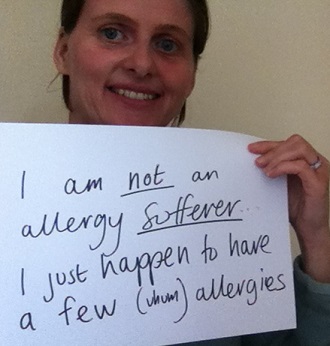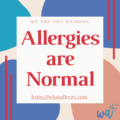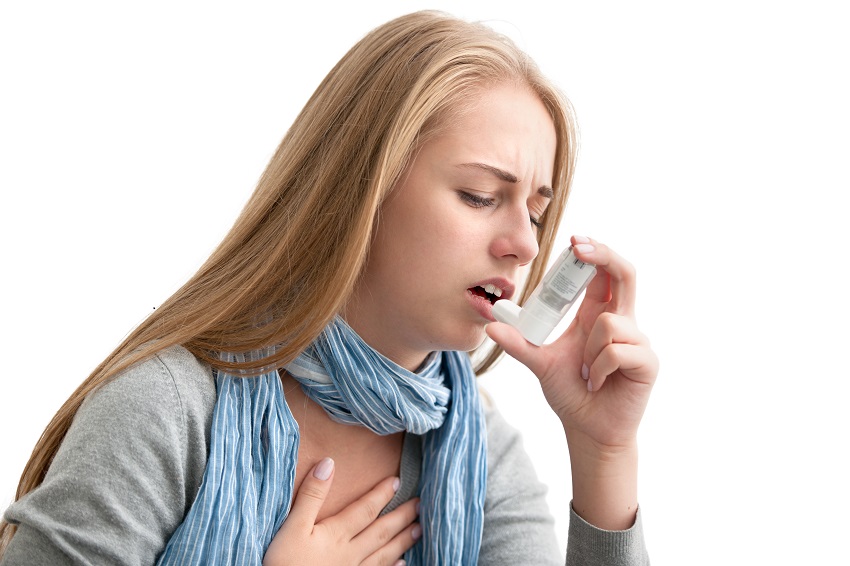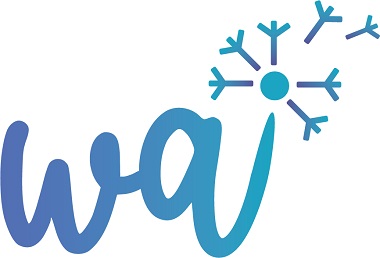How do you feel when someone refers to you as an eczema sufferer or an allergy sufferer?
We have to live with it but we don’t have to suffer.
Well, apart from the eczema flare-ups and the allergic reactions which plague us; but we can choose to take a positive stance, get on with life and live with it as best we can.
We don’t suffer our allergies, we live the best, safest and most positive life that we can despite them.
If we suffer our allergies we allow negative thoughts to pervade and this leads to low self esteem, depression and greater feelings of loneliness, isolation and pain. And we’ve all been there. That little voice in your head that picks away. The ‘why me’ voice.
So if you do use the word sufferer – try to use a different word from now on.
Let’s purge our dictionary of the word sufferer in reference to allergies and eczema.
Terms that refer to the disabled and other minorities have evolved over time to replace negative terms with more progressive ones.
The term “allergy sufferers” is outdated, considered derogatory and reinforces negative stereotypes. Further, language shapes an issue. If one sees a person with a disability as a “sufferer, disabled or afflicted”, then one does not feel obliged to try to address that person’s needs. The inference is that the person will suffer, regardless of efforts, and that the person is a tragic figure. Many people with allergies lead full, productive lives and do not suffer the majority of the time. They live with allergies just as others live with all kinds of conditions.
Use instead a person with allergies or person with a disability, because people with disabilities do not necessarily suffer.
It’s the same with the term wheelchair bound – having grown up with an aunt who used a wheelchair, far from binding her, it gave her freedom. Without it she couldn’t have done all the amazing things she did despite living with multiple sclerosis.
Do you use the term ‘sufferer’ to describe people with allergies?
Do you agree that using more positive or factual descriptions helps to give a more rounded understanding and avoids negative stigma and offence?
Let’s change how people talk, write and think about allergies and other disabilities.
Everything is easier to live with if you think positively and grasp onto the really good things about your situation. There are loads of really positive outcomes from me having allergies and I’ve written about this a few times, not least in “10 reasons to be cheerful about allergies”
So do you hate the term allergy sufferer? are you an eczema sufferer or are you not bothered at all?
This also touches on the subject of disabilities. Do people with allergies have a disability? We could chat about this for hours… So what’s your view on the subject? Let’s have a heated debate!













When I wrote my books on allergies / intolerances my publisher advised me to avoid using the word ‘suffer’ or ‘sufferer’ – but of course it slips in without you realising it. I think it upsets some people and others are quite blase’ about it – and this comes from having interviewed lots of people with coeliac and various sensitivities over the years. I wonder whether we should also re-evaluate use of the word ‘disease’ too in some circumstances. Are those with coeliac disease who’ve been living a healthy gluten-free life for some years ‘diseased’ – and do they think of themselves as such? I doubt it, in most cases….
It’s not something I’d given an awful lot of thought to until a few people commented on the header on my blog home page. When you then think about it it is quite negative term. Although many of us with allergies, eczema and conditions like coeliac disease DO suffer, suffering is something you can choose not to let take over your life. Describing someone as a ‘sufferer’ implies they are constantly in pain, or continually suffering. This is often not the case. When I’m in control, staying safe, not taking risks and not eating out I’m as fit as a fiddle. It’s when I get ‘allergied’ or have an allergic reaction that I do suffer but these events are becoming less frequent.
Disease is a similar word. Dis-Ease. I’m inclined to agree with you about that. I don’t think of myself having allergic disease and eczema is often described as a disease. The word means a) A disorder of structure or function in a human, animal, or plant, esp. one that produces specific signs or symptoms or that affects a…
b) A particular quality, habit, or disposition regarded as adversely affecting a person or group of people.
Which then brings us onto the subject of disabilities and whether someone with serious allergies, multiple allergies or coeliac disease is disabled? I certainly feel like I’m at the bottom of the pile when eating out. Vegetarians and vegans now get very good catering in most cases and they are making a lifestyle choice. Yet it seems as if allergies and the food challenged community are classes as ‘just being fussy’. Oh I could go on… and on…